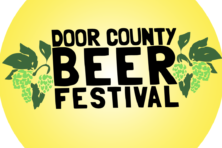Talking Brews with the Wisconsin Beer Baron
- Share
- Tweet
- Pin
- Share

Chris Drosner has covered the state’s beer scene throughout the craft-beer boom through his Wisconsin Beer Baron column. I recently caught up with Drosner – who is also the editor of Milwaukee Magazine – for a conversation on the Door County Pulse podcast about the state of beer in the Badger State.

Myles Dannhausen Jr. (MD): You’ve been covering the industry in an incredibly exciting time for beer in the state. What has that been like, and is the industry still growing?
Chris Drosner (CD): The development and evolution of this industry in the state has been fascinating to cover.
It has been pretty much constant growth since the early to mid-2000s. The number of breweries has continued to increase – just at a slower pace of growth. But you’re also starting to see breweries close now. [Nationwide, growth peaked in 2018, when 1,219 breweries opened. Growth dipped to 600 new openings in 2022, with 250 breweries closing.]
The two big examples of that are Milwaukee Brewing Company in Milwaukee and Ale Asylum in Madison. They each built really big breweries and couldn’t meet the demand that that capital investment requires. The brands still exist, with Ale Asylum purchased by Karben4, and Milwaukee Brewing by Eagle Park.
MD: What is the biggest trend you’ve seen in the past couple years?
CD: The big one is the trend toward breweries focusing on and maximizing their own taprooms. When you make a six-pack of beer and send it out to the world, you’re going through a distributor who gets a cut, and you’re packaging and shipping that product. When you’re selling a pint out of your taproom, the markup is maybe 10 times what it is on the six-pack.
MD: What is the biggest change you’ve seen on the business side of craft brewing since you began covering the industry?
CD: By 2020, we had started to see that regional or national approach start to fail. Breweries that were kind of trying to do the super-regional thing really disappeared in the couple of years before the pandemic.
The breweries that had goals of distributing to 10 states and becoming the next big thing in craft beer – I don’t think there will ever be that anymore. I think that moment has passed. One of the reasons for that is that there is good beer happening wherever you are, so that you don’t really need to have the big thing.
Small breweries have gotten a lot better. There was a time when a big part of my column was updating people on new breweries from outside of the state now selling in Wisconsin. I still do it, but it has really slowed down, but the quality of beer made in Wisconsin has increased a lot. Plus, people want to buy local and eat local and drink local.
MD: What makes breweries such a big attraction for tourists?
CD: One of the expectations has become that when people are traveling, they want to try the local beer – it’s something they’ve never had before. There is true local culture in that glass. If the brewery is doing it right, there’s a story there, a reflection of the place.
MD: What’s next for the industry in Wisconsin? Where are we going?
CD: I do think breweries will continue to open because they have a different horizon for success now: places that get into it to create a good beer and a place for the community to come together and enjoy it. I think for places like Sway, or Peach Barn, the goals are different and smaller, and I think that is viable.
MD: What is your fallback beer?
CD: Right now, I’m finding myself going for Happy Place from Third Space. Why wouldn’t you want to order something called Happy Place? I’ll also be drinking a lot of Dan Carey’s newest beer at New Glarus, named simply the New Glarus Pilsner.
I’ve come to enjoy a lot more of the craft lagers. I used to ignore them. I would only go there if I really trusted the brewer because it takes great skill to make those styles well. There’s a lot more of that skill around these days.
MD: What’s your advice to those who remain hesitant to try craft beers?
CD: If you think you don’t like beer, it’s just because you haven’t tried enough beer. There’s literally something for everyone. It’s a simple and affordable luxury in life.



